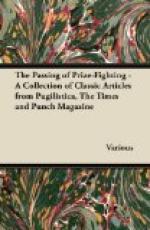Title: Punch, Or The London Charivari, VOL. 100. Feb. 28, 1891
Author: Various
Release Date: August 3, 2004 [EBook #13098]
Language: English
Character set encoding: ASCII
*** Start of this project gutenberg EBOOK Punch ***
Produced by Malcolm Farmer, William Flis, and the
Online Distributed
Proofreading Team.
PUNCH,
Or the London charivari.
Vol. 100.
February 28, 1891.
SPECIMENS FROM MR. PUNCH’S SCAMP-ALBUM.
No. II.—The literary “Ghost.”
[Illustration]
We will assume, simply for the purposes of this argument, that you, reader, are an innocent-minded elderly lady, and a regular subscriber to the Local Circulating Library. You are sitting by your comfortable fireside, knitting a “cross-over” for a Bazaar, when your little maid announces a gentleman, who says he has not a card-case with him, but requests that you will see him.
“You are sure he is a gentleman, Mary Ann?” you will inquire, with a slight uneasiness as to the umbrellas in the hall.
“Oh, a puffict gentleman, Mam,” says Mary Ann—“with a respirator.”
Upon this testimony to his social standing, you direct that the perfect gentleman shall be shown in.
Mary Ann has not deceived you—he has a respirator, also blue spectacles, and a red nose. He apologises with fluent humility for intruding upon you without the honour of a previous acquaintance, and takes a chair, after which he shifts his respirator to his chin, sheds a pair of immense woollen gloves into his hat, and produces a bundle of papers, over which he intreats you to cast an eye. On perusing them, they prove to be letters from various eminent authors, whose names are, more or less, familiar to you. These documents are more interesting as autographs than from any intrinsic literary merit, for they all refer to remittances for various amounts, and regret politely that the writer is not in a position to obtain permanent employment for his correspondent. While you are reading them, your visitor pays assiduous court to your cat—which impresses you favourably.
“Possibly, Madam,” he suggests, “you may be personally acquainted with some of those gentlemen?” When you confess that you have not that honour, he seems more at his ease.
“I asked,” he says, “because I have long heard of you as a Lady of great taste and judgment in literary matters—which, after seeing you, I can the more readily understand.”
It is a fact that several of your nieces and female neighbours are in the habit of declaring that they would rather take your opinion on a novel than that of all the critics; still, you had not expected your fame to have spread so wide.




